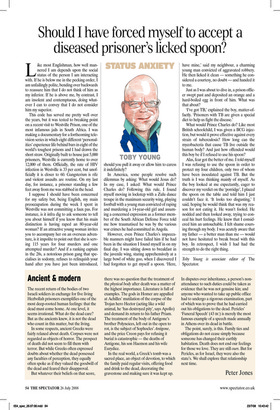Should I have forced myself to accept a diseased prisoner’s licked spoon?
Like most Englishman, how well mannered I am depends upon the social status of the person I am interacting with. If he is below me in the pecking order, I am unfailingly polite, bending over backwards to reassure him that I do not think of him as my inferior. If he is above me, by contrast, I am insolent and contemptuous, doing whatever I can to convey that I do not consider him my superior.
This code has served me pretty well over the years, but it was tested to breaking point on a recent visit to Westville Prison, one of the most infamous jails in South Africa. I was making a documentary for a forthcoming television series in which eight different ‘personalities’ experience life behind bars in eight of the world’s toughest prisons and I had drawn the short straw. Originally built to house just 5,000 prisoners, Westville is currently home to over 12,000 of them. Officially, the rate of HIV infection in Westville is 33 per cent, but unofficially it is closer to 60. Gangsterism is rife and violent assaults are routine. On my last day, for instance, a prisoner standing a few feet away from me was stabbed in the head.
I suppose I should have been concerned for my safety but, being English, my main preoccupation during the week I spent in Westville was not committing a faux pas. For instance, is it infra dig to ask someone to tell you about himself if you know that his main distinction is having raped an 80-year-old woman? If an attractive young woman invites you to accompany her on an overseas adventure, is it impolite to point out that she is serving 115 years for four murders and one attempted murder? And if a ranking captain in the 28s, a notorious prison gang that specialises in sodomy, refuses to relinquish your hand after you have just been introduced, should you pull it away or allow him to caress it indefinitely?
In America, some people resolve such dilemmas by asking: What would Jesus do? In my case, I asked: What would Prince Charles do? Following this rule, I found myself moving in lockstep with a Zulu dance troupe in the maximum security wing, playing football with a young man convicted of raping and murdering a 14-year-old girl and assuming a concerned expression as a former member of the South African Defense Force told me how traumatised he was by the various war crimes he had committed in Angola.
However, even Prince Charles’s impeccable manners might have failed him if he had been in the situation I found myself in on my final day. I was sitting down to breakfast in the juvenile wing, staring apprehensively at a large bowl of white goo, when I discovered I had forgotten to get myself a spoon. ‘Here, have mine,’ said my neighbour, a charming young man convicted of aggravated robbery. He then licked it clean — something he considered a courtesy, no doubt — and handed it to me.
Just as I was about to dive in, a prison officer swept past and deposited an orange and a hard-boiled egg in front of him. What was that about?
‘I’ve got TB,’ explained the boy, matter-offactly. ‘Prisoners with TB are given a special diet to help us fight the disease.’ What would Prince Charles do? Like most British schoolchild, I was given a BCG injection, but would it prove effective against every strain of tuberculosis? How long can the mycobacteria that cause TB live outside the human body? And just how offended would this boy be if I refused to use his spoon?
Alas, fear got the better of me. I told myself I was refusing to use the spoon in order to protect my four children, only two of whom have been inoculated against TB. But the truth is I was thinking mainly of myself. As the boy looked at me expectantly, eager to discover my verdict on the ‘porridge’, I placed the spoon on the table and told him I just couldn’t face it. ‘It looks too disgusting,’ I said, hoping he would think that was my reason for not eating it. He wasn’t fooled. He nodded and then looked away, trying to conceal his hurt feelings. He knew that I considered him an untouchable. I felt shame coursing through my body. I was acutely aware that my father — a better man than me — would not have hesitated to break bread with this boy. In retrospect, I wish I had had the strength to do the right thing.
Toby Young is associate editor of The Spectator.


























































 Previous page
Previous page